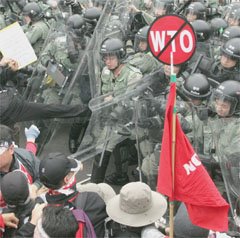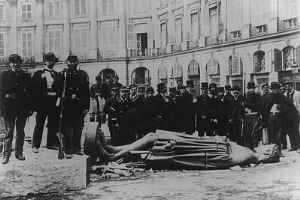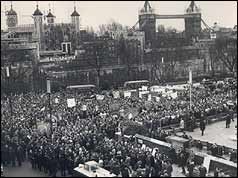Wednesday, December 14, 2005
Anti-capitalism hits Hong Kong: Kong Yee Sai Mau! posted by Richard Seymour

The irony is that the only way to have prevented waves of anti-capitalist protesters from taking to Hong Kong over the latest round of world trade talks would have been to have China annexe the former colony. The alternative to that has been to deploy the classic methods of dissimulation about the protests: worry and gripe about 'violence', make the odd contemptuous concession to the Geldof-Oxfam spectrum of feed-the-world opinion and reproduce the protest slogans without explanation so as to make them appear absurd. Like this, this, this and this.
 The issues are concisely summarised by Nurul Qoiriah of the Indonesian Migrant Workers’ Union and Focus on the Global South:
The issues are concisely summarised by Nurul Qoiriah of the Indonesian Migrant Workers’ Union and Focus on the Global South:Under Gats one country may request another country to open up several service sectors, but the requested government is also free to offer only those it is willing to open up, or even not to make any offers at all.
The Hong Kong text subverts this. It stipulates that the requested countries shall enter into negotiations. And, once this happens, all manner of pressure can be applied.
“Model agreements” will be set up to privatise and liberalise key sectors, and these will then be generalised.
WTO director-general Pascal Lamy tries to cover this up with the offer of “Aid for Trade”. This is a ploy to confuse and weaken the resistance of developing countries as the programme only goes towards building the capacity of developing countries to implement agreements that they were forced to accept in the first place.
The text on agriculture reflects the positions of exporting countries and the interests of their agribusiness. Despite longstanding demands to cut their direct and indirect export subsidies, the tabled proposals are “paper-cuts” that do not change the status quo in favour of developing countries.
Instead, what the European Union and the US have done is reinforce the imbalance by expanding the “Blue Box” (subsidies which are on hold and not for immediate removal), which will allow an additional US $5 billion of farm support for the US and the maintenance of the “Green Box” (permitted subsidies) which the European Commission will use for its agribusiness support.
The text also does not give any date for an end to export subsidies.
Such subsidies, which are largely provided to the biggest producers and their agribusiness as opposed to family farm based agriculture, will be allowed to continue unabated.
In return for this, developing countries are expected to fully open their markets through drastic tariff reduction and to cut their remaining, if any, domestic supports.
It is impossible to see how this agreement, which threatens to wipe out peasants and small farmers, can be classified as a “development round”.
The Non-Agricultural Market Access text has been strongly criticised for its bias towards developed countries as it glosses over the wide opposition from least developed and developing countries to the proposals.
The text is a threat to developing countries as the draconian formulas proposed threaten to wipe out their industries and remove any future policy space to determine their own development priorities.
Movements are as one in voicing their opposition to this threat to the world’s peoples. They are intensifying their struggle in order to prevent this deal from going through in the coming WTO ministerial in Hong Kong.
Vandana Shiva:
What is offered as the “Development Package” in the draft Hong Kong declaration of 26th November 2005 is “Aid for Trade” with World Bank and IMF further locking Third World countries in debt through loans for ‘trade related infrastructure” – more ports, more superhighways, leading to more green house gases, more climate change. This is not a “development package” but a recipe for environment disaster. World Bank is also pushing water privatization as trade related infrastructure.
The “Aid for Trade” package is in fact World Bank and IMF loans joining with WTO rules to impose trade liberalization on Third World Countries. Now that the marginalized and excluded players have learnt to exercise their power in WTO through non-cooperation, they are refusing to cooperate with demands for further trade liberalization in agriculture, and introduction of trade liberalization in services and industrial production. And they need to reject the “Aid of Trade” package in the draft Hong Kong Ministerial Text.
...
The Draft Hong Kong Declaration is an attempt to retreat from commitments made at Doha. Para 18 of the Doha Declaration addressed the extension of the protection of geographical indications provided for in Article 23 to products other than wines and spirits. These products are of interest to developing countries and include products such as Basmati rice (pirated and patented by Ricetec corporation of Texas) and Darjeeling tea. The Hong Kong Declaration makes no reference to extension of geographical indicators to other products.
Para 19 of Doha was an instruction to undertake the mandatory review of Article 27.3(b) of TRIPS and the review of the implementation of the TRIPS agreement under Article 71.1, taking fully into account the development dimension. The work programme of Para 19 related to review of TRIPS finds no mention in the Hong Kong draft.
The phasing out of export subsidies agreed to in Doha has disappeared in the new text.
The Doha text had reaffirmed “the right of members under the General Agreement on Trade in Services to regulate, and to introduce new regulations on the supply of services”. For Hong Kong this has been diluted to “with due respect to the right to regulate”.
 So, we're talking about an attempt to force developing countries to open up their markets to Western capital to the enormous disadvantage of local industries. The quite predictable effect of forcing South Korea to open up its market to international rice producers when its farmers already produce more than the country actually consumes will be to drive farmers out of business. The usual corrollary is that rural workers flee to towns and cities to seek work, and end up in dirty, overcrowded accomodation with exorbitant rents to pay and high levels of unemployment. For those who try to stick it out, there's always poverty and malnutrition. And that just repeats a pattern seen all over the world.
So, we're talking about an attempt to force developing countries to open up their markets to Western capital to the enormous disadvantage of local industries. The quite predictable effect of forcing South Korea to open up its market to international rice producers when its farmers already produce more than the country actually consumes will be to drive farmers out of business. The usual corrollary is that rural workers flee to towns and cities to seek work, and end up in dirty, overcrowded accomodation with exorbitant rents to pay and high levels of unemployment. For those who try to stick it out, there's always poverty and malnutrition. And that just repeats a pattern seen all over the world.
If you want to know what TRIPs are about, consider the attempt by US agribusiness outfit RiceTec to patent a broad range of Basmati rice strains - that is, to own the kinds of rice that Indian farmers have been growing for centuries. Or the attempt to stop India producing cheap AIDS drugs. It is about extending the capitalist logic of turning everything - including killer diseases - into property, and a profit opportunity. You want to know who the businesses are which are pushing for success in this round of trade talks? Consider ABCDoha who regard human rights laws as a "competitive disadvantage". And what exactly is a rules-based global economy under the rubric of the WTO? One in which El Salvador is obliged to reduce its minimum wage from 60 cents an hour to 36 cents an hour because 60 cents is an unfair barrier to trade.
That's the kind of world the capitalist class is trying to construct with the aid of governments and a few coopted NGOs. That is why this round of talks deserves to fail, and why there are protests in Hong Kong. Tomb regular Guy Taylor of Globalise Resistance is blogging the protests at regular interventals, while Focus on the Global South has some excellent material and regular updates.










